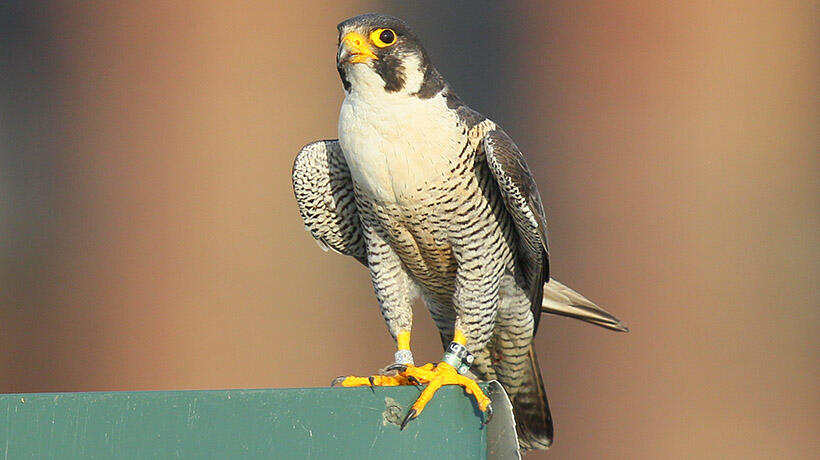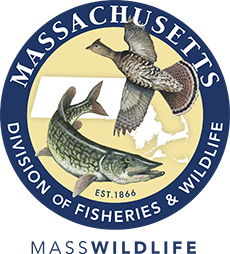- Division of Fisheries and Wildlife
Media Contact
Media Contact, MassWildlife

On March 30, 2018, MassWildlife received a call from North Andover resident Robert Carlson reporting two Peregrine Falcons fighting on his front lawn. When he and his mother came outside, one of the falcons flew off, but the second bird did not. Eventually, four more people approached the bird. The group split in half with three people on one side and three on the other, all about three feet away from the bird. That's when the first bird came back and swooped down between the people to strike the bird on the ground, and then it returned to strike the bird a second time. Twenty minutes later the second peregrine flew off.
Three days later, the 17-year-old male Peregrine Falcon (band numbers 2206-59866, and 6*/4* black over green) was found on the ground in a back yard in Amesbury, about 15 air miles from the location of the fight in North Andover and about a mile from its nest site in Lawrence. A New Hampshire falconer saw a photo of the peregrine in a parakeet cage that was posted on Facebook by the elderly man who found the bird. The falconer notified a Massachusetts falconer and educator who picked up the bird and brought him to the Tufts Wildlife Clinic in North Grafton. The peregrine was in poor shape and died several hours after arriving at the clinic.
This original resident male, which was banded in Manchester, New Hampshire in 2001, had been nesting in Lawrence since in 2003. He helped fledge 42 chicks (21 male, 21 female) in 14 years (3 chicks per year), which is a very high reproductive rate. He was the second oldest banded male peregrine to have nested in Massachusetts. The oldest being a 19 year old male.
This story appears in Massachusetts Wildlife magazine, Number 2, 2018.
Photo credit: Craig Gibson
Massachusetts Wildlife magazine subscribers, watch your mailbox in mid-July!
Feature stories in the next issue include the following.
Restore the Call: Loon Restoration in the Northeast (Deborah Mckew)
The return of an adult, translocated common loon to the Assawompset Pond Complex in southern Massachusetts marks a milestone for loon conservation efforts in the Northeast.
Of Pollinators, Food, and Poisons (Richard A. Callahan)
The author describes experiments performed over several years that demonstrate a direct link between long-term, low-level exposure to imidacloprid, a widely used neonicotinoid pesticide, and aberrant behavior in adult overwintering honeybees resulting in hive abandonment and death.
Dad’s Last Fishing Trip (Alison Colby-Campbell)
MassWildlife hatchery staff and a local community come together to help an World War II veteran enjoy a final fishing trip in Haverhill.
Bird Banding: a Morning Afield (Brandi Van Roo)
Join the author and her university students for a morning banding songbirds and woodpeckers during spring migration.
